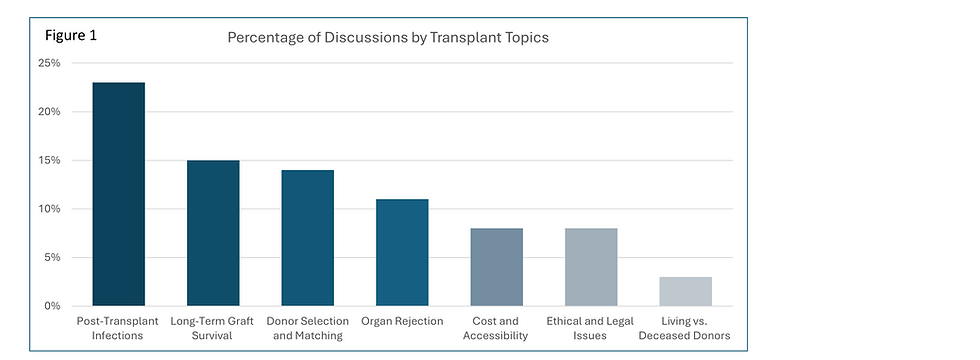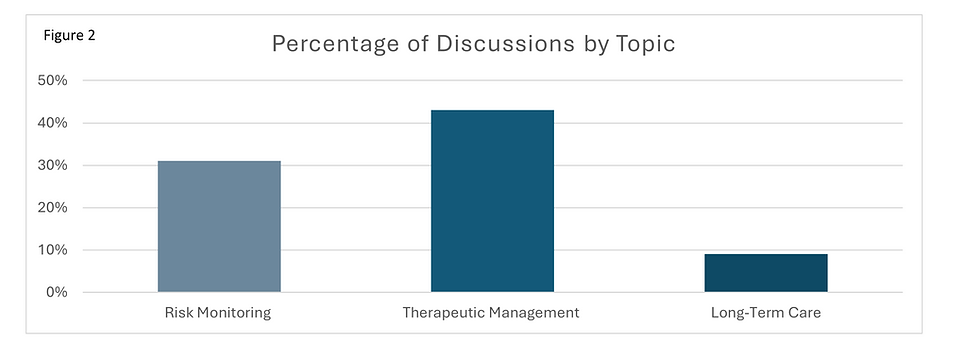Transplants- Keyword Analysis
Topics/keywords: ‘transplant’
Data types: posts, comments, likes, polls
Geographical segment: global physicians, physicians by region
Analyzed data points on G-Med: 7,221
Specialties: Surgery, Infectious Disease, Hematology, Nephrology, Hepatology
Countries analyzed: 67
Reach: 65,136
Introduction
This report presents an in-depth analysis of physician conversations surrounding the topic of transplants, based on data collected from the G-Med platform. The dataset includes physician-generated posts and their corresponding peer comments, offering global insights into the challenges and priorities clinicians face when managing transplant-related cases. Using a combination of keyword mapping, sentiment evaluation, and geographic comparisons, this report identifies recurring themes in diagnosis, treatment, and follow-up. The analysis draws exclusively from G-Med data, standardized and translated for consistency.
Main Concerns of G-Med Physicians on the Topic of Transplants
.png)
· Post-Transplant Infections (23% of physician discussions)
Physicians raised concern over infections such as CMV, sepsis, and opportunistic pneumonias in immunosuppressed patients.
o 58% of related discussions expressed frustration over treatment difficulty and high morbidity.
o 42% shared successful case outcomes or discussed prophylactic strategies.
· Long-Term Graft Survival Concerns (15%)
Discussions covered chronic graft deterioration, late rejection, and recurrence of disease.
o 43% reflected optimism about graft monitoring and newer immunomodulatory strategies.
o 57% were negative, often describing long-term uncertainty or repeat interventions.
· Donor Selection and Matching (14%)
Physicians discussed HLA typing, donor-recipient compatibility, and organ allocation strategies.
o 66% emphasized the need for equity and to refine the criteria for how patients are assessed and prioritized on transplantation waiting lists.
o 34% shared positive sentiments about national or institutional matching systems.
· Organ Rejection and Immunosuppression (11%)
Concerns were voiced about acute and chronic rejection and balancing immunosuppressive efficacy with side effects.
o 54% expressed caution about long-term immunosuppression toxicity.
o 46% discussed new therapies or regimens with optimism.
· Cost and Accessibility (8%)
Cost barriers to transplantation were noted in both high- and low-resource settings.
o 71% of physicians highlighted issues of affordability, especially in medication access post-surgery.
o 29% shared health system policies that supported equitable access.
· Ethical and Legal Issues (8%)
Some discussions addressed black market organ trade, allocation fairness, and legal frameworks. Physicians also debated how to expand donor pools (e.g., revisiting eligibility criteria), opt-in vs. opt-out donation systems, and the practical/ethical challenges of counseling living donors (e.g., informed consent, psychosocial pressure, and long-term implications for donors).
o 75% expressed concern over unethical practices.
o 25% called for clearer, internationally harmonized guidelines.
· Living vs. Deceased Donors (3%)
While only marginally mentioned, some physicians noted preferences and complications specific to donor type. A small subset also referenced xenotransplantation in practice (e.g., animal-derived heart valve grafts) or as an emerging area of interest, contrasting risk/benefit profiles with conventional donation.
Key Points on Risk Monitoring, Therapeutic Management, and Long-Term Care
Risk Monitoring (31% of physician discussions)
Infection Workup in Febrile Recipients: Physicians emphasized prompt diagnostic imaging and microbiology panels. 61% favored comprehensive workups, while 39% raised concerns about overtesting.
Monitoring Graft Function: Creatinine levels and liver enzymes were frequently cited. 48% endorsed them as reliable indicators; 52% asked for better non-invasive markers.
Therapeutic Management (43%)
Immunosuppressive Drug Management: Discussions centered on tacrolimus, cyclosporin, and steroid tapering. Physicians also discussed everolimus and mycophenolate (and, less frequently, azathioprine) in maintenance regimens, weighing efficacy against nephrotoxicity and metabolic side effects. Therapeutic views were split:57% advocated traditional triple therapy; 43% supported personalized regimens or agent substitutions to mitigate long-term toxicity and drug interactions, with regimen choice often tied to graft type and patient comorbidities.
Antimicrobial Prophylaxis: 68% of physicians supported proactive infection prevention in transplant recipients; 32% highlighted resistance and side effect concerns. Frequently mentioned agents included valganciclovir (CMV prevention), cotrimoxazole / TMPSMX (Bactrim) for pneumocystis prophylaxis, and antifungals such as fluconazole and voriconazole, with choices driven by local epidemiology, prior infections, and toxicity profiles.
Long-Term Care (9%)
Long-Term Adherence: Medication non-compliance and follow-up dropouts were common themes. 59% suggested digital tools or reminders; 41% noted socioeconomic or psychological barriers.
Cancer Surveillance Post-Transplant: A small number raised the need for skin and lymphoproliferative cancer monitoring, especially in long-term survivors.
.png)
Geographical Analysis of Physician Discussions on Transplants

Of the 67 countries analyzed, the following topics were discussed in prominent countries:
United States: Strong focus on immunosuppressive therapy management and balancing infection risks. Cost concerns were commonly mentioned, particularly regarding post-transplant medications.
Canada: Positive sentiment toward system-supported transplant programs and insurance-based access. Physicians also emphasized adherence challenges.
France: Physicians discussed both ethical allocation and access support via national transplant programs. Concerns around immunosuppressive toxicity were also present.
United Kingdom: Emphasized protocol-driven follow-up and cautious immunosuppressive use. Discussions often referenced national guidelines.
Germany: Highlighted structured care, routine monitoring, and drug regimen choices, often within a standardized framework.
Italy: Shared views on traditional immunosuppressive protocols, including tacrolimus use. Several discussions focused on optimizing follow-up adherence.
Spain: Common themes included infection management and high drug costs.
Brazil: Physicians frequently cited affordability issues, lack of formal monitoring, and elevated infection risk under immunosuppression.
Mexico: Noted high infection rates and inconsistent follow-up practices. Cost barriers were a recurring theme.
Cross-Country Differences in Transplant Management
This section highlights key dimensions of variation across countries, based on content analysis of physician discussions.
Confidence vs. Concern in Immunosuppressive Therapy
This theme reflects physician sentiment toward standard immunosuppressive regimens (e.g., tacrolimus, cyclosporine) versus concerns about adverse effects.
Confidence in Immunosuppression:
Most evident in the United States, Canada, the United Kingdom, and Brazil, where physicians frequently discussed tacrolimus and triple therapy with clinical confidence and routine use.Concern about Immunosuppression:
Prominent in France and Germany, where discussions focused on long-term toxicity, infection risk, and post-transplant lymphoproliferative disorder (PTLD).
Cost Barriers vs. Access Support
This theme examines disparities in affordability and coverage of transplant care.
Access Support:
Visible in Germany, Canada, and the United Kingdom, where physicians described insurance reimbursement, public transplant coverage, or structured care funding.Cost Barriers:
Most commonly cited in Spain, the United States, and Brazil, with physicians reporting medication costs as a significant obstacle to long-term care.
.png)
Engagement Recommendations:

As can be seen from the report, there are some knowledge gaps on the topic of transplants, especially surrounding graft risk factors and long-term care. An awareness campaign could be beneficial in this case.
G-Med's Awareness Package could be a good fit here.





.png)